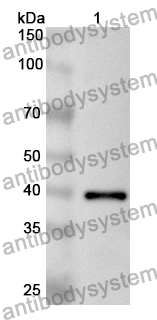Catalog No.
PHK35701
Species reactivity
Human
Host species
Rabbit
Isotype
IgG
Clonality
Polyclonal
Immunogen
E. coli - derived recombinant Human OPTN (Ser415-Arg524).
Tested applications
ELISA: 1:4000-1:8000, IHC: 1:50-1:100, WB: 1:1000-1:4000
Target
NRP, TFIIIA-IntP, Huntingtin-interacting protein 7, HIP-7, Huntingtin yeast partner L, Transcription factor IIIA-interacting protein, NEMO-related protein, E3-14.7K-interacting protein, GLC1E, HIP7, HYPL, FIP-2, Huntingtin-interacting protein L, Optic neuropathy-inducing protein, OPTN, Optineurin, FIP2
Purification
Purified by antigen affinity column.
Accession
Q96CV9
Applications
ELISA, IHC, WB
Form
Liquid
Storage buffer
0.01M PBS, pH 7.4, 50% Glycerol, 0.05% Proclin 300.
Stability and Storage
Use a manual defrost freezer and avoid repeated freeze thaw cycles. Store at 2 to 8°C for frequent use. Store at -20 to -80°C for twelve months from the date of receipt.
Cleavage of the selective autophagy receptor NBR1 by the PDCoV main protease NSP5 impairs autophagic degradation of the viral envelope protein., PMID:40047225
Induction outcomes in adult kidney transplantation: Two decades of UNOS data analysis., PMID:39947488
Impact of Multiple Kidney Retransplants on Post-Transplant Outcomes in the United States., PMID:39826993
Hyperphosphorylated tau targeting human serum albumin Fusion protein as therapeutics for Alzheimer's diseases., PMID:39634029
Deciphering melanophagy: role of the PTK2-ITCH-MLANA-OPTN cascade on melanophagy in melanocytes., PMID:39477686
Cleavage of SQSTM1/p62 by the Zika virus protease NS2B3 prevents autophagic degradation of viral NS3 and NS5 proteins., PMID:39128850
Outcomes of Kidney Transplants From Toxoplasma-Positive Donors: An Organ Procurement and Transplant Network Database Analysis., PMID:39055345
Compartmentalized mitochondrial ferroptosis converges with optineurin-mediated mitophagy to impact airway epithelial cell phenotypes and asthma outcomes., PMID:38987265
Hepatitis B transmission/reactivation associated with Hepatitis B core antibody and Hepatitis C nucleic acid testing positive organs: A report from the Organ Procurement and Transplantation Network Disease Transmission Advisory Committee., PMID:38881210
CCDC50 mediates the clearance of protein aggregates to prevent cellular proteotoxicity., PMID:38869076
OPTN/SRTR 2022 Annual Data Report: Kidney., PMID:38431360
Temporal trends in kidney paired donation in the United States: 2006-2021 UNOS/OPTN database analysis., PMID:37739347
Physician Preferences when Selecting Candidates for Lower-Quality Kidney Offers., PMID:37729938
Differences between Kidney Transplant Recipients from Deceased Donors with Diabetes Mellitus as Identified by Machine Learning Consensus Clustering., PMID:37511707
Association between calculated panel reactive antibody and waitlist outcomes in the 2018 heart allocation system., PMID:37268050
Differences between Very Highly Sensitized Kidney Transplant Recipients as Identified by Machine Learning Consensus Clustering., PMID:37241209
Development of a calculated panel reactive antibody calculator for the United Arab Emirates: a proof of concept study., PMID:37231090
OPTN/SRTR 2021 Annual Data Report: Kidney., PMID:37132350
The association of donor hepatitis C virus infection with 3-year kidney transplant outcomes in the era of direct-acting antiviral medications., PMID:37130619
OPTN required SARS-CoV-2 lower respiratory testing for lung donors: Striking the balance., PMID:36864666
The real unmet need: A multifactorial approach for identifying sensitized kidney candidates with low access to transplant., PMID:36841966
Porcine reproductive and respiratory syndrome virus degrades DDX10 via SQSTM1/p62-dependent selective autophagy to antagonize its antiviral activity., PMID:36779599
Neutralizing peripheral circulating IL1β slows the progression of ALS in a lentivirus-infected OPTNE478G mouse model., PMID:36575589
Infliximab Induction Lacks Efficacy and Increases BK Virus Infection in Deceased Donor Kidney Transplant Recipients: Results of the CTOT-19 Trial., PMID:36195441
Varying Utilization Rates but Superior Outcomes in Liver Transplantation From Hepatitis C-positive Donors in the United States: An Analysis of the OPTN/UNOS Database., PMID:35507448
HLA Homozygosity and Likelihood of Sensitization in Kidney Transplant Candidates., PMID:35415215
TRAF6 autophagic degradation by avibirnavirus VP3 inhibits antiviral innate immunity via blocking NFKB/NF-κB activation., PMID:35266845
Utilization of HCV viremic donors in kidney transplantation: a chance or a threat?, PMID:35260039
MEK inhibition overcomes chemoimmunotherapy resistance by inducing CXCL10 in cancer cells., PMID:35051357
US deceased kidney transplantation: Estimated GFR, donor age and KDPI association with graft survival., PMID:34386752
Transcriptomic Profiles of CD47 in Breast Tumors Predict Outcome and Are Associated with Immune Activation., PMID:33917174
Risk factors for delayed graft function and their impact on graft outcomes in live donor kidney transplantation., PMID:33394282
Vitamin D - A host directed autophagy mediated therapy for tuberculosis., PMID:33039674
A simple electronic tool for assessing amino acid sequence polymorphisms within exon-2 of HLA-DPB1 alleles., PMID:32684412
Acceptable Post-Heart Transplant Outcomes Support Temporary MCS Prioritization in the New OPTN|UNOS Heart Allocation Policy., PMID:32650992
Stem cell donor HLA typing improves CPRA in kidney allocation., PMID:32558252
OPTN/SRTR 2018 Annual Data Report: Liver., PMID:31898413
Sex differences in preformed panel-reactive antibody levels and outcomes in patients undergoing heart transplantation., PMID:31012162
Emerging views of mitophagy in immunity and autoimmune diseases., PMID:30951392
Allocation of the Highest Quality Kidneys and Transplant Outcomes Under the New Kidney Allocation System., PMID:30929853
Role of induction therapy in low immunological risk-kidney transplant recipients: A mate-kidney analysis., PMID:30408257
Increasing Trends in Transplantation of HCV-Positive Livers Into Uninfected Recipients., PMID:30268562
Glucocorticoids use in kidney transplant setting., PMID:30265586
Lymphocyte depletion and risk of acute rejection in renal transplant recipients at increased risk for delayed graft function., PMID:30171800
Mapping molecular HLA typing data to UNOS antigen equivalents., PMID:30118777
Measuring and monitoring equity in access to deceased donor kidney transplantation., PMID:29734498
HLA-DQ Mismatching and Kidney Transplant Outcomes., PMID:29685925
A simplified method of calculating cPRA for kidney allocation application in Hong Kong: a retrospective study., PMID:28777478
Parkin overexpression protects retinal ganglion cells against glutamate excitotoxicity., PMID:28761318
Inducible turnover of optineurin regulates T cell activation., PMID:28192730

